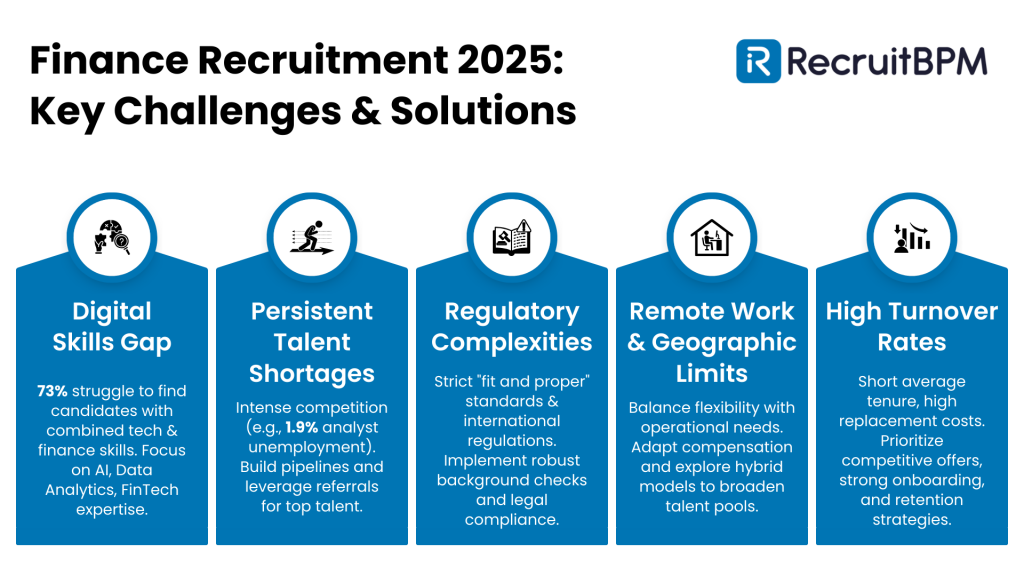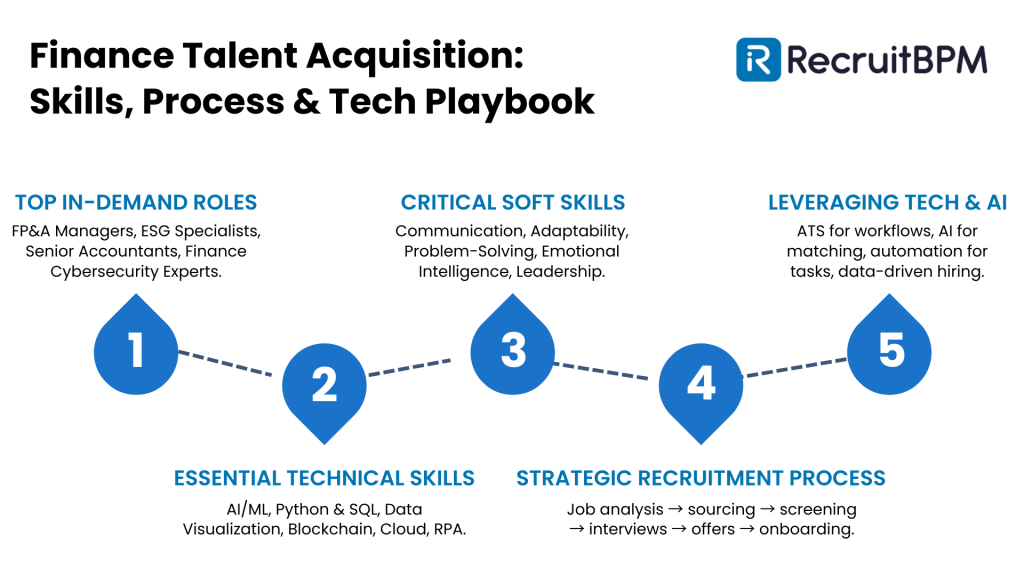The finance industry faces unprecedented transformation. Digital disruption reshapes traditional banking. Talent shortages plague accounting departments. Yet opportunities abound for those who master modern recruitment strategies.
Finance recruitment has evolved beyond posting jobs and reviewing resumes. Today’s financial institutions need sophisticated approaches to attract specialized talent. They compete with fintech startups for tech-savvy professionals. They navigate complex regulatory requirements while building diverse teams.
This comprehensive guide reveals proven strategies for finance recruitment success. You’ll discover how to overcome talent shortages effectively. You’ll learn which skills matter most in 2025. Most importantly, you’ll understand how technology transforms hiring processes.
What is Finance Recruitment?
Finance recruitment connects qualified professionals with financial sector opportunities. It encompasses sourcing, screening, and placing candidates across banking, accounting, investment, and insurance sectors. The process demands deep industry knowledge and specialized recruitment expertise.
Key Players in Financial Services Talent Acquisition
Multiple stakeholders drive successful finance recruitment outcomes. Each plays distinct yet interconnected roles throughout the hiring process.
Hiring Managers define role requirements and make final decisions. They understand team dynamics and skill gaps. Their insights shape job descriptions and candidate evaluation criteria.
HR Departments orchestrate the recruitment process systematically. They manage job postings across multiple channels. They coordinate interviews and handle administrative tasks. They ensure compliance with employment regulations.
Finance Recruitment Agencies bring specialized market knowledge. They maintain extensive networks of passive candidates. They understand compensation benchmarks and industry trends. Their expertise accelerates time-to-hire metrics significantly.
Internal Talent Acquisition Teams align recruitment with organizational culture. They champion employer branding initiatives. They manage candidate relationships throughout the hiring journey. They facilitate smooth onboarding experiences.
Technology Platforms like RecruitBPM streamline recruitment workflows. They automate repetitive tasks efficiently. They provide data-driven insights for better decisions. They enhance collaboration between all stakeholders involved.
Critical Finance Recruitment Challenges in 2025
Finance recruitment faces mounting pressures from multiple directions. Understanding these challenges enables better strategic planning. It helps organizations develop proactive solutions rather than reactive responses.

Digital Skills Gap Crisis
The digital skills gap represents finance recruitment’s biggest challenge. Traditional finance professionals often lack technical expertise. Meanwhile, tech-savvy candidates may lack financial knowledge depth.
Organizations report 73% difficulty in finding candidates with balanced skill sets. They need professionals who understand both spreadsheets and APIs. Candidates must navigate legacy systems while implementing new technologies. This combination remains frustratingly rare.
The gap widens as technology advances accelerate. AI and machine learning transform financial analysis. Blockchain disrupts traditional transaction processing. Cloud computing revolutionizes data management approaches. Each innovation demands new competencies.
Universities haven’t caught up with industry needs. Finance curricula still emphasize traditional accounting principles. Technology components remain optional rather than integrated. Graduates enter the workforce unprepared for digital realities.
Talent Shortage Statistics and Impact
Numbers paint a stark picture of talent scarcity. Financial analyst unemployment sits at just 1.9%. This falls well below the 4.2% national average. Competition for qualified candidates intensifies accordingly.
The accounting profession faces particular challenges. CPA exam candidates decreased 30% over five years. Meanwhile, demand for accounting services grows steadily. The gap between supply and demand widens annually.
Small firms suffer disproportionately from talent shortages. They can’t match Big Four compensation packages. They lack extensive training programs. They struggle to attract entry-level talent. Many resort to expensive contract solutions.
Impact extends beyond recruitment metrics. Projects stall without adequate staffing. Compliance risks increase with overworked teams. Innovation suffers when employees focus solely on maintenance tasks.
Regulatory Compliance Complexities
Regulatory requirements complicate every recruitment decision. Financial institutions must verify that candidates meet “fit and proper” standards. Background checks extend beyond criminal records. They encompass credit histories, professional licenses, and regulatory sanctions.
Compliance failures carry severe consequences. Penalties can reach millions in fines. Reputational damage lasts for years. Personal liability extends to hiring managers. One bad hire triggers regulatory scrutiny.
International regulations add layers of complexity. GDPR affects candidate data handling. Anti-money laundering rules require specific expertise. Cross-border hiring involves multiple jurisdictional requirements. Each regulation demands careful navigation.
The burden falls heavily on recruitment teams. They must stay current with changing regulations. They need robust verification processes. They require legal support for complex cases. All while maintaining competitive hiring speeds.
Remote Work and Geographic Limitations
Remote work transformed finance recruitment permanently. Candidates expect flexibility post-pandemic. Yet many financial institutions mandate office presence. This disconnect eliminates potential candidates immediately.
Geographic constraints persist despite technological advances. Some roles require physical presence for security reasons. Client-facing positions need local market knowledge. Regulatory requirements may mandate specific locations. These limitations shrink available talent pools.
Time zones create collaboration challenges. Global teams struggle to coordinate meetings. Project handoffs become complicated. Real-time problem solving suffers. Organizations must balance flexibility with operational needs.
Compensation disparities complicate remote recruitment. San Francisco salaries don’t translate to Kansas. Cost-of-living adjustments create internal inequities. Organizations struggle to develop fair compensation frameworks. Competition comes from companies without geographic constraints.
High Turnover Rates in Financial Services
Finance professionals change jobs frequently. Average tenure dropped to 3.5 years. Junior employees leave even faster. Replacement costs average 150% of annual salaries.
Multiple factors drive high turnover rates. Burnout from excessive workloads takes its toll. Limited advancement opportunities frustrate ambitious professionals. Better compensation elsewhere tempts even satisfied employees. Work-life balance concerns push talent toward flexible employers.
The Great Resignation hit finance particularly hard. Employees reassessed career priorities. Many left for industries offering better flexibility. Others started independent consulting practices. The talent pool shrank while demand increased.
Retention challenges compound recruitment difficulties. Organizations constantly backfill positions. Institutional knowledge walks out the door. Team productivity suffers from constant transitions. Recruitment becomes a never-ending cycle rather than strategic growth.
Most In-Demand Finance Roles and Skills for 2025
Understanding market demand guides recruitment priorities effectively. Some positions command premium salaries. Others attract numerous qualified candidates. Knowing the difference shapes successful strategies.
Top 10 Finance Positions Companies Need Now
Financial Planning & Analysis (FP&A) Managers are consistently in top demand lists. They transform raw data into strategic insights. They guide executive decision-making directly. Their blend of technical and communication skills remains rare.
ESG Reporting Specialists emerge as critical hires. Environmental, social, and governance factors drive investment decisions. Regulations require detailed sustainability reporting. Few professionals possess the requisite expertise currently.
Senior Accountants address the accounting shortage directly. They manage complex financial reporting requirements. They ensure regulatory compliance meticulously. Experienced professionals command significant premiums.
Financial Controllers oversee entire accounting operations. They implement internal controls rigorously. They manage team performance effectively. Their leadership skills matter as much as technical knowledge.
Risk Management Analysts protect organizations from threats. They model potential scenarios comprehensively. They develop mitigation strategies proactively. Their work prevents costly mistakes.
Treasury Managers optimize cash management strategically. They manage banking relationships carefully. They execute hedging strategies skillfully. Their decisions impact profitability directly.
Tax Specialists navigate increasingly complex regulations. They identify optimization opportunities legally. They manage audit relationships professionally. Their expertise saves millions annually.
Internal Auditors ensure operational excellence consistently. They identify process improvements systematically. They verify compliance thoroughly. Their independence provides crucial oversight.
Investment Analysts evaluate opportunities rigorously. They model complex transactions accurately. They present recommendations persuasively. Their insights drive growth strategies.
Cybersecurity Specialists (Finance Focus) protect sensitive financial data. They understand both technology and finance. They implement security protocols effectively. Their role grows more critical daily.
Essential Technical Skills: AI, Data Analytics, and FinTech
Technical proficiency separates exceptional candidates from adequate ones. Modern finance professionals need diverse digital competencies. These skills complement rather than replace traditional expertise.
Artificial Intelligence and Machine Learning transform financial analysis. Professionals must understand AI applications practically. They need to interpret model outputs accurately. They should identify appropriate use cases clearly.
Python programming enhances analytical capabilities significantly. SQL enables direct database queries efficiently. R supports statistical analysis powerfully. These languages become standard tools gradually.
Data Visualization makes complex information accessible. Tableau creates interactive dashboards dynamically. Power BI integrates with Microsoft ecosystems seamlessly. These tools communicate insights effectively.
Blockchain Technology disrupts traditional processes fundamentally. Understanding distributed ledgers becomes essential. Smart contract knowledge adds value. Cryptocurrency familiarity helps navigate emerging markets.
Cloud Computing Platforms are increasingly hosting financial applications. AWS, Azure, and Google Cloud dominate markets. Understanding cloud architecture aids system integration. Security considerations remain paramount always.
Robotic Process Automation (RPA) eliminates repetitive tasks. UiPath and Blue Prism lead automation efforts. Understanding automation potential identifies efficiency opportunities. Implementation experience commands premiums.
Critical Soft Skills Finance Professionals Must Have
Technical skills open doors. Soft skills determine success. Modern finance professionals need both equally.
Communication Excellence bridges the technical and business worlds. Complex concepts require simple explanations. Stakeholder management demands clear messaging. Presentation skills influence decision-makers directly.
Written communication matters enormously. Reports must convey insights concisely. Emails should communicate professionally. Documentation needs clarity and precision.
Adaptability enables survival amid constant change. Regulations shift frequently. Technologies evolve rapidly. Market conditions fluctuate unpredictably. Flexible professionals thrive regardless.
Problem-Solving Creativity differentiates top performers. Standard solutions don’t fit unique challenges. Innovation drives competitive advantages. Creative thinking uncovers hidden opportunities.
Emotional Intelligence improves team dynamics substantially. Understanding motivations enhances collaboration. Managing conflicts professionally maintains productivity. Building relationships accelerates career growth.
Leadership Potential matters at every level. Individual contributors influence peers. Managers inspire team performance. Executives shape organizational culture. Leadership skills multiply individual impact.
FP&A and ESG Expertise Requirements
Two specializations dominate 2025 recruitment conversations. FP&A and ESG expertise command premium compensation. Understanding their requirements helps target recruitment efforts.
FP&A Professionals blend multiple competencies uniquely. They master financial modeling techniques thoroughly. They understand business operations deeply. They communicate insights persuasively. They influence strategic decisions directly.
Advanced Excel remains foundational, surprisingly. Financial modeling requires complex formulas. Scenario analysis demands dynamic models. Automation through VBA adds efficiency. These skills form the baseline.
Modern FP&A extends beyond spreadsheets significantly. Predictive analytics anticipate future trends. Machine learning improves forecast accuracy. Data visualization communicates complex narratives. Technology amplifies traditional skills exponentially.
ESG Specialists navigate emerging reporting frameworks. They understand SASB, GRI, and TCFD standards. They collect sustainability data systematically. They ensure reporting accuracy meticulously. They align metrics with business strategy.
Carbon accounting becomes increasingly important. Supply chain analysis reveals environmental impacts. Social metrics quantify diversity progress. Governance assessments evaluate board effectiveness. Each area requires specialized knowledge.
Regulatory knowledge proves essential constantly. EU taxonomy affects European operations. SEC climate rules impact public companies. Industry-specific requirements add complexity. Staying current demands continuous learning.
The Finance Recruitment Process: Step-by-Step Guide
Systematic recruitment processes yield better outcomes consistently. Each stage requires careful attention. Shortcuts create problems later inevitably.

Job Analysis and Requirements Definition
Successful recruitment starts with thorough preparation. Understanding role requirements prevents costly mistakes. Clear definitions attract appropriate candidates. Vague descriptions waste everyone’s time.
Begin by analyzing actual job responsibilities. What tasks occupy daily activities? Which decisions require this role’s input? How does this position create value? Answers shape realistic job descriptions.
Distinguish between essential and preferred qualifications. Must-haves eliminate unqualified candidates. Nice-to-haves differentiate among qualified applicants. This distinction focuses recruitment efforts effectively.
Consider cultural fit alongside technical requirements. What personality traits suit your team? Which work styles align with company culture? How important is industry experience? These factors influence long-term success.
Document everything clearly and specifically. Generic job descriptions attract generic candidates. Detailed requirements attract targeted applications. Specificity saves time throughout recruitment processes.
Strategic Candidate Sourcing Methods
Multiple sourcing channels increase candidate quality and quantity. Relying on single sources limits options unnecessarily. Diverse approaches uncover hidden talent effectively.
LinkedIn remains the primary professional network. Advanced search filters identify passive candidates. InMail messages initiate direct conversations. Company pages showcase the employer brand effectively.
Industry Associations connect with specialized professionals. CPA societies host networking events. Banking associations maintain member directories. Professional certifications indicate commitment levels.
University Partnerships build talent pipelines systematically. Internship programs identify future employees. Campus recruiting events generate interest early. Alumni networks provide warm referrals.
Employee Referrals produce high-quality candidates consistently. Current employees understand culture fit. They pre-screen candidates informally. Referral bonuses incentivize participation. These hires typically stay longer.
Recruitment Marketing attracts passive candidates creatively. Content marketing demonstrates thought leadership. Social media showcases company culture. SEO optimization improves job posting visibility.
Resume Screening Best Practices
Efficient screening processes eliminate unqualified candidates quickly. This focuses resources on promising applicants. Technology accelerates initial reviews significantly.
Establish clear screening criteria upfront. Create scorecards rating essential qualifications. Weight factors according to importance. Apply criteria consistently across candidates.
RecruitBPM’s AI-powered screening saves hours weekly. Machine learning identifies qualified candidates automatically. Natural language processing extracts key information. Automation handles high-volume applications efficiently.
Look beyond keywords for context. Years of experience matter less than achievements. Job titles vary across organizations. Responsibilities indicate actual expertise better.
Red flags warrant careful consideration. Unexplained gaps need exploration. Frequent job changes raise questions. Inconsistencies require verification. Trust intuition about concerning patterns.
Interview Techniques for Finance Roles
Effective interviews evaluate both technical competence and cultural fit. Structured approaches reduce bias. Consistent questions enable fair comparisons.
Technical Assessments verify claimed expertise. Case studies simulate real scenarios. Excel tests demonstrate practical skills. Presentation exercises showcase communication abilities. These evaluations predict performance accurately.
Behavioral Questions reveal past performance patterns. “Tell me about a time when…” prompts specific examples. The STAR method structures responses clearly. Past behavior predicts future actions reliably.
Cultural Fit Discussions explore alignment with values. Work style preferences matter significantly. Career motivations indicate retention likelihood. Team dynamics questions assess collaboration potential.
Panel Interviews provide multiple perspectives. Different stakeholders evaluate various aspects. Group dynamics reveal interpersonal skills. Consensus building improves hiring decisions.
Virtual interviews require special considerations. Test technology beforehand thoroughly. Establish eye contact through cameras. Allow for technical difficulties gracefully. Judge fairly despite format limitations.
Reference and Background Check Protocols
Verification protects organizations from costly mistakes. Thorough checks reveal potential issues early. Due diligence prevents regulatory violations.
Start with employment verification basics. Confirm positions, dates, and responsibilities. Verify claimed achievements independently. Check for discrepancies carefully.
Professional references provide performance insights. Prepare specific questions in advance. Listen for hesitation or evasion. Read between the lines carefully. Multiple references reveal patterns.
Background checks must comply with regulations. FCRA requirements apply nationally. State laws add additional restrictions. Consent must be obtained properly. Adverse action procedures protect candidates.
Financial services require enhanced screening. Credit checks reveal financial responsibility. Regulatory databases identify past violations. Professional licenses need verification. Security clearances may be necessary.
Making Competitive Job Offers
Compelling offers secure top candidates. Competitive packages prevent bidding wars. Quick decisions demonstrate organizational efficiency.
Research market compensation thoroughly. Salary surveys provide benchmarks. Competitor analysis reveals positioning. Cost-of-living adjustments ensure fairness. Total compensation includes all benefits.
Structure offers strategically and thoughtfully. Base salary provides stability. Bonuses reward performance. Equity creates long-term alignment. Benefits address personal needs. Flexibility might outweigh compensation.
Present offers professionally and enthusiastically. Highlight growth opportunities clearly. Emphasize unique value propositions. Address concerns proactively. Create excitement about joining.
Negotiate respectfully but firmly. Understand deal-breakers versus preferences. Offer creative solutions when possible. Know your limits clearly. Close decisively when agreement is reached.
Onboarding Finance Professionals Successfully
Effective onboarding accelerates productivity significantly. First impressions shape retention rates. Investment here pays dividends long-term.
Pre-boarding begins immediately after acceptance. Send welcome packages promptly. Complete paperwork electronically. Assign mentors early. Schedule first-day activities. Address questions quickly.
First Week focuses on orientation basics. Introduce team members systematically. Explain organizational structure clearly. Review policies and procedures. Set up technology access. Establish communication protocols.
First Month builds foundational knowledge. Provide role-specific training comprehensively. Clarify performance expectations explicitly. Schedule regular check-ins. Gather feedback actively. Adjust approaches accordingly.
First Quarter integrates fully into Teams. Assign meaningful projects gradually. Increase responsibilities systematically. Provide continuous feedback. Celebrate early wins. Address challenges supportively.
Measure onboarding effectiveness regularly. Track time-to-productivity metrics. Survey new hire satisfaction. Monitor early turnover rates. Refine processes continuously.
Technology and AI in Finance Recruitment
Technology transforms recruitment from art to science. Data drives better decisions. Automation eliminates inefficiencies. AI identifies patterns humans miss.
How RecruitBPM’s ATS Transforms Finance Hiring?
RecruitBPM revolutionizes finance recruitment workflows comprehensively. The platform combines ATS and CRM functionality seamlessly. This integration eliminates system switching constantly.
Customizable pipelines match unique processes perfectly. Drag-and-drop interfaces simplify workflow management. Automated actions trigger at predetermined stages. Team collaboration happens within one platform.
The system scales effortlessly with growth. Add one recruiter or one hundred. Features work identically regardless of size. Performance remains consistent under load. Growth doesn’t require system changes.
Real-time analytics provide actionable insights immediately. Track source effectiveness accurately. Monitor time-to-fill metrics closely. Identify bottleneck locations quickly. Data guides process improvements systematically.
AI-Powered Candidate Matching
Artificial intelligence revolutionizes candidate identification. Machine learning algorithms analyze thousands of variables. Pattern recognition identifies ideal candidates. Predictive models forecast success probability.
RecruitBPM’s AI examines resumes intelligently. Natural language processing extracts meaningful information. Semantic analysis understands context beyond keywords. Skills matching goes deeper than surface-level scanning.
The system learns from hiring decisions continuously. Successful placements refine algorithms. Feedback loops improve accuracy. Bias detection ensures fair evaluation. Quality improves over time automatically.
Passive candidate identification expands talent pools. AI identifies professionals ready for change. Predictive analytics spot flight risks. Proactive outreach prevents competitor poaching.
Automation Tools for Finance Recruiters
Automation handles repetitive tasks efficiently. This frees recruiters for strategic activities. Productivity increases without adding headcount.
Email Automation nurtures candidate relationships systematically. Drip campaigns maintain engagement. Personalized messages feel individually crafted. Follow-ups happen automatically. Response rates improve significantly.
Interview Scheduling eliminates back-and-forth coordination. Candidates self-select available times. Calendar integration prevents conflicts. Reminders reduce no-shows. Rescheduling happens seamlessly.
Document Management organizes materials automatically. Resume parsing extracts key information. Compliance documents get stored securely. Version control maintains accuracy. Search functions locate information instantly.
Reporting Automation generates insights effortlessly. Scheduled reports arrive automatically. Dashboards update in real-time. Custom metrics track specific goals. Stakeholders stay informed constantly.
Data-Driven Recruitment Strategies
Data transforms gut feelings into informed decisions. Metrics reveal what actually works. Analytics guide resource allocation. Evidence replaces assumptions systematically.
Source Analytics optimizes recruitment spending. Track which channels deliver quality. Calculate cost-per-hire by source. Identify diminishing returns quickly. Allocate budgets strategically.
Time-to-Fill Analysis reveals process inefficiencies. Measure stage-by-stage duration. Compare against industry benchmarks. Identify improvement opportunities. Implement targeted solutions.
Quality of Hire Metrics validate recruitment effectiveness. Track performance ratings post-hire. Monitor retention rates carefully. Measure hiring manager satisfaction. Connect recruitment to business outcomes.
Diversity Analytics ensures inclusive hiring. Monitor pipeline diversity consistently. Identify bias points systematically. Track progress toward goals. Adjust strategies based on results.
Predictive analytics anticipate future needs. Turnover models forecast departures. Skill gap analysis identifies training needs. Succession planning prepares for transitions. Proactive recruitment prevents crisis hiring.

Building Your Finance Recruitment Strategy
Strategic recruitment aligns with business objectives directly. Reactive hiring creates problems. Proactive planning ensures success. Investment in strategy pays dividends.
Employer Branding for Financial Institutions
Strong employer brands attract top talent naturally. Candidates research companies thoroughly. Online presence influences application decisions. Authentic branding resonates with professionals.
Define your employee value proposition clearly. What makes your organization unique? Why should candidates choose you? How do you support career growth? These answers shape messaging consistently.
Showcase company culture authentically. Employee testimonials provide credibility. Day-in-the-life content humanizes organizations. Behind-the-scenes videos create connections. Authentic content outperforms polished marketing.
Leverage employee advocacy programs effectively. Encourage social media sharing. Recognize employee achievements publicly. Create pride in organizational membership. Happy employees attract similar professionals.
Address negative reviews constructively. Respond professionally to criticism. Show commitment to improvement. Thank reviewers for feedback. Demonstrate maturity and a growth mindset.
Creating Compelling Finance Job Descriptions
Exceptional job descriptions attract exceptional candidates. Generic posts get lost in the noise. Compelling content stands out immediately.
Start with attention-grabbing headlines. Include specific role titles. Add location and key benefits. Make scrolling thumbs stop. First impressions matter enormously.
Structure Content for Scannability. Use short paragraphs throughout. Include bullet points liberally. Bold key information strategically. Make content mobile-friendly always.
Sell the opportunity enthusiastically. Describe the impact clearly. Highlight growth potential. Explain learning opportunities. Create excitement about possibilities.
Include specific requirements carefully. Distinguish must-haves from nice-to-haves. Avoid unnecessary qualifications. Don’t eliminate diverse candidates. Focus on potential over pedigree.
Incorporate SEO best practices. Research relevant keywords thoroughly. Include terms naturally throughout. Optimize meta descriptions. Improve search visibility dramatically.
Contract vs. Permanent Finance Staffing Solutions
Different situations require different solutions. Permanent hires build long-term capabilities. Contract staff provide flexibility. Understanding when each works optimizes outcomes.
Contract Staffing Advantages include flexibility and specialized expertise. Scale teams quickly for projects. Access skills are not needed permanently. Reduce long-term commitments. Test cultural fit before hiring.
Permanent Hiring Benefits build institutional knowledge. Create team stability. Develop company-specific expertise. Foster loyalty and engagement. Reduce constant recruiting needs.
Hybrid approaches combine both benefits. Contract-to-hire arrangements reduce risk. Core teams stay permanent. Specialists augment capabilities. Flexibility meets stability needs.
Cost considerations extend beyond salaries. Training investments differ significantly. Benefit costs vary substantially. Productivity ramps differ. Total costs surprise many organizations.
Finance Recruitment Best Practices for 2025
Excellence requires continuous improvement. Best practices evolve constantly. Staying current ensures a competitive advantage. Implementation determines actual success.
Speed Up Your Finance Hiring Process
Lengthy processes lose top candidates. Competing offers arrive quickly. Decision delays frustrate everyone. Speed without sacrificing quality wins.
Streamline interview processes intelligently. Combine multiple rounds when possible. Use panel interviews efficiently. Leverage video for initial screens. Respect the candidate’s time always.
Accelerate decision-making systematically. Establish clear evaluation criteria. Empower hiring managers appropriately. Set decision deadlines firmly. Communicate promptly always.
RecruitBPM reduces time-to-hire by 40%. Automation eliminates administrative delays. Collaboration tools speed communication. Mobile access enables anywhere decisions. Technology drives efficiency gains.
Prepare offers in advance strategically. Know salary ranges beforehand. Get approvals proactively. Draft paperwork early. Move quickly when ready.
Diversity and Inclusion in Financial Services
Diverse teams outperform homogeneous ones consistently. Different perspectives drive innovation. Inclusive cultures attract talent. DEI initiatives deliver ROI.
Remove bias from job descriptions. Use inclusive language throughout. Avoid unnecessary requirements. Focus on skills over credentials. Welcome diverse backgrounds explicitly.
Expand sourcing channels deliberately. Partner with diverse organizations. Attend varied career fairs. Post on specialized job boards. Build diverse talent pipelines.
Structure interviews to reduce bias. Use consistent question sets. Include diverse interview panels. Score candidates objectively. Document decisions thoroughly.
Track diversity metrics religiously. Monitor pipeline composition. Measure offer acceptance rates. Analyze retention by demographics. Adjust strategies based on data.
Create inclusive onboarding experiences. Address different learning styles. Provide cultural mentorship. Foster psychological safety. Celebrate diverse perspectives.
Skills-Based Hiring Approaches
Traditional credentials don’t predict performance reliably. Skills-based hiring expands talent pools. Potential matters more than pedigree. This approach finds hidden gems.
Identify core competencies precisely. What skills drive success? Which capabilities can be taught? How do skills translate across industries? These answers guide the assessment.
Design skills assessments carefully. Test actual job requirements. Use work samples when possible. Simulate real scenarios. Measure what matters most.
Consider alternative credentials seriously. Bootcamps produce capable professionals. Certifications demonstrate commitment. Self-taught skills prove motivation. Experience comes in many forms.
Provide training and development. Invest in high-potential candidates. Create apprenticeship programs. Offer continuous learning. Build skills internally.
Building Talent Pipelines for Future Needs
Proactive pipeline building prevents desperate hiring. Relationships developed over time yield better fits. Warm candidates convert faster. Investment today prevents tomorrow’s crisis.
Map future skill requirements systematically. Anticipate retirements proactively. Plan for growth strategically. Identify emerging competencies. Prepare for industry changes.
Engage passive candidates consistently. Share valuable content regularly. Invite to networking events. Maintain casual contact. Build relationships before needs arise.
Develop internal talent systematically. Identify high-potential employees. Provide stretch assignments. Offer leadership development. Create clear advancement paths.
Partner with educational institutions strategically. Shape curriculum development. Offer internships and co-ops. Give a guest lecture regularly. Build brand awareness early.
Solutions for Common Finance Recruitment Pain Points
Every organization faces recruitment challenges. Common problems have proven solutions. Implementation requires commitment and resources. Results justify the investment.
Attracting Passive Finance Candidates
Most talented professionals aren’t actively looking. Passive candidates require different approaches. Traditional job postings won’t reach them. Creative strategies capture attention.
Content Marketing demonstrates thought leadership. Publish finance insights regularly. Share industry analysis. Provide valuable resources. Position as an expert destination.
Executive Search Techniques target specific individuals. Research ideal candidates thoroughly. Craft personalized outreach messages. Highlight unique opportunities. Persistence pays off eventually.
Networking Events create natural connections. Host industry meetups. Sponsor professional conferences. Participate in panel discussions. Build relationships organically.
Employee Advocacy leverages existing networks. Encourage referral programs. Share job opportunities socially. Recognize successful referrals. Make advocacy easy and rewarding.
Competing with FinTech for Talent
FinTech companies offer exciting opportunities. Traditional institutions seem outdated comparatively. Competition for talent intensifies. Strategic positioning changes perceptions.
Emphasize stability and resources. Established institutions offer security. Training programs develop skills. Career paths provide advancement. Benefits packages excel.
Highlight transformation initiatives. Digital projects excite technologists. Innovation labs foster creativity. Modernization efforts attract talent. Change narratives resonate strongly.
Create startup-like environments internally. Offer autonomy and ownership. Encourage experimentation safely. Reduce bureaucracy significantly. Speed decision-making processes.
Leverage brand recognition effectively. Established names carry weight. Alumni networks provide connections. Global opportunities exist. Prestige still matters.
Reducing Time-to-Hire Metrics
Extended hiring processes frustrate everyone. Candidates accept other offers. Hiring managers grow impatient. Productivity suffers from vacancies.
Analyze current process bottlenecks. Where do delays occur? Which stages take the longest? What causes holdups? Data reveals improvement opportunities.
Set aggressive timeline targets. Establish stage-specific deadlines. Hold stakeholders accountable. Track metrics consistently. Celebrate improvements achieved.
Pre-approve common scenarios. Establish salary bands clearly. Delegate decision authority appropriately. Create contingency plans. Reduce approval layers.
Maintain ready-to-hire pipelines. Keep warm candidates engaged. Pre-screen for common roles. Build talent communities. React quickly to openings.
Improving Candidate Experience
Positive experiences create brand ambassadors. Poor treatment damages reputations. Every interaction matters significantly. Investment here multiplies returns.
Communication keeps candidates informed. Acknowledge applications promptly. Provide timeline expectations. Update status regularly. Close loops professionally.
Respect demonstrates organizational values. Value candidate time. Provide interview feedback. Treat everyone courteously. Remember human elements.
Transparency builds trust immediately. Explain processes clearly. Share decision criteria. Discuss challenges honestly. Set realistic expectations.
Technology enhances experience seamlessly. Mobile-optimize application processes. Enable self-service scheduling. Provide virtual interview options. Simplify document submission.
Gather feedback systematically. Survey all candidates. Analyze pain points. Implement improvements quickly. Show commitment to excellence.
How RecruitBPM Simplifies Finance Recruitment?
RecruitBPM transforms complex recruitment into manageable processes. The platform addresses every challenge discussed. Implementation delivers immediate improvements. Results speak for themselves.
End-to-End Recruitment Platform Features
Complete functionality eliminates tool proliferation. One platform handles everything. No integration headaches. No data silos. Just seamless workflows.
Applicant Tracking manages candidates efficiently. Track progress visually. Collaborate with teams. Automate communications. Maintain compliance easily.
CRM Capabilities nurture relationships continuously. Build talent communities systematically. Engage passive candidates regularly. Track interaction history completely. Convert prospects into placements.
Job Distribution maximizes posting reach. Post to multiple boards simultaneously. Track source effectiveness accurately. Optimize spending intelligently. Reduce manual posting time.
The Analytics Dashboard provides real-time insights. Monitor key metrics instantly. Generate custom reports easily. Share data with stakeholders. Make data-driven decisions confidently.
Customizable Workflows for Finance Teams
Every organization recruits differently. Rigid systems frustrate users. Flexibility ensures adoption. Customization drives efficiency.
Drag-and-drop pipeline builders simplify configuration. Create custom stages easily. Define automated actions. Set user permissions. Adapt as needs change.
Role-based workflows streamline processes. Junior accountant pipelines differ from CFO searches. Contract workflows vary from permanent. Each process is optimized appropriately. Consistency meets flexibility perfectly.
Approval chains match organizational structures. Multi-level approvals when required. Parallel processing where appropriate. Exception handling is built in. Compliance requirements satisfied automatically.
Template libraries accelerate implementation. Industry best practices included. Customize from proven foundations. Share successful workflows. Learn from community experiences.
Real-Time Analytics and Reporting
Data drives continuous improvement. Real-time visibility enables quick adjustments. Comprehensive reporting satisfies stakeholders. Analytics transform recruitment effectiveness.
Pipeline Analytics reveal process health. See bottlenecks immediately. Track conversion rates precisely. Identify drop-off points. Optimize stages systematically.
Source Performance guides investment decisions. Compare channel effectiveness. Calculate ROI accurately. Identify trending sources. Allocate resources strategically.
Team Performance metrics ensure accountability. Track individual productivity. Compare team members fairly. Identify training needs. Recognize top performers.
Diversity Reporting monitors inclusion progress. Track demographic pipelines. Measure hiring outcomes. Identify bias points. Demonstrate commitment transparently.
Custom reports address specific needs. Schedule automated delivery. Export data easily. Integrate with BI tools. Answer questions instantly.
Integration Capabilities
Modern recruitment requires multiple tools. Integration eliminates duplication. Data flows seamlessly. Productivity increases dramatically.
HRIS Integration synchronizes employee data. Onboarding flows smoothly. Data remains consistent. Manual entry eliminated. Compliance has been simplified significantly.
Calendar Synchronization streamlines scheduling. Availability updates automatically. Interview conflicts were prevented. Reminders sent reliably. Time zones handled correctly.
Email Integration centralizes communications. Track all correspondence. Automate follow-ups. Maintain conversation history. Search messages easily.
Background Check Providers accelerate verification. Order checks directly. Track status automatically. Receive results instantly. Maintain audit trails.
API access enables custom integrations. Connect any system. Build unique workflows. Automate complex processes. Scale without limits.
Finance Recruitment FAQs
Common questions deserve clear answers. Understanding basics helps everyone. Knowledge reduces uncertainty. Clarity improves decisions.
What Qualifications Do Finance Recruiters Need?
Successful finance recruiters blend multiple competencies. Technical knowledge provides credibility. Interpersonal skills build relationships. Business acumen drives results.
Educational backgrounds vary significantly. Finance degrees provide industry knowledge. Psychology degrees understand human behavior. Business degrees grasp organizational needs. Success depends more on skills than degrees.
Industry certifications add value. SHRM certification demonstrates HR expertise. CPA knowledge helps evaluate accountants. Financial licenses provide technical credibility. Continuous learning matters most.
Experience accelerates success significantly. Understanding finance roles helps evaluate candidates. Knowing market dynamics guides strategies. Building networks takes time. Relationships drive long-term success.
Soft skills determine effectiveness ultimately. Communication abilities are crucial for all interactions. Negotiation skills close deals. Persistence overcomes obstacles. Empathy builds lasting relationships.
How Long Does Finance Recruitment Take?
Timeline varies by position complexity. Entry-level roles fill faster. Executive searches take months. Specialized positions require patience. Market conditions affect duration.
Average Timelines provide general guidance. Junior positions: 2-4 weeks typically. Mid-level roles: 4-6 weeks commonly. Senior positions: 6-12 weeks frequently. Executive roles: 3-6 months, possibly.
Factors affecting duration include market competitiveness. Candidate availability impacts timing. Internal processes cause delays. Decision-making speed varies. Negotiation complexity extends timelines.
Acceleration strategies reduce timeframes. Pre-approved job descriptions save days. Standing interview panels speed selection. Predetermined salary ranges eliminate negotiation. Pipeline candidates shorten searches.
RecruitBPM reduces hiring time by 40%. Automation eliminates administrative delays. Collaboration tools speed communication. Analytics identify bottlenecks. Technology drives efficiency consistently.
What’s the Cost of Finance Recruitment Services?
Recruitment costs vary widely. Internal costs are often hidden. External fees seem expensive. Total cost calculations surprise many. ROI justifies investment, typically.
Internal Recruitment Costs include salaries and overhead. Advertising expenses add up. Technology subscriptions accumulate. Training investments compound. Opportunity costs matter significantly.
Agency Fees range from 15-30% typically. Contingency recruiters charge on success. Retained search requires upfront investment. Specialized firms command premiums. Quality correlates with cost often.
Cost of Bad Hires exceeds recruitment fees. Productivity losses mount quickly. Training investments are wasted. Team morale suffers. Client relationships were potentially damaged.
Technology Solutions provide scalable alternatives. RecruitBPM costs a fraction of agencies. Automation reduces labor needs. Efficiency improvements compound savings. ROI is typically within months.
Value considerations extend beyond cost. Time savings matter enormously. Quality improvements reduce turnover. Strategic advantages accrue. Investment perspective required.
How to Evaluate Finance Recruitment Agencies?
Choosing recruitment partners requires diligence. Not all agencies deliver equally. Evaluation criteria guide selection. Due diligence prevents disappointment.
Track Record demonstrates capability. Request client references. Review placement statistics. Verify industry expertise. Check regulatory compliance.
Specialization Depth matters significantly. Generalists lack financial knowledge. Specialists understand nuances. Niche expertise commands premiums. Deep knowledge delivers results.
Process Transparency indicates professionalism. Clear communication is expected. Regular updates required. Honest feedback is valued. Ethical practices are essential.
Technology Capabilities differentiate modern firms. Database quality matters. Sourcing tools are essential. Analytics drive insights. Innovation indicates investment.
Cultural Alignment ensures partnership success. Values must align. Communication styles should mesh. Expectations need clarification. Chemistry matters surprisingly.
Take Action: Transform Your Finance Hiring Today
Knowledge without action accomplishes nothing. Implementation drives results. Starting today matters. Small steps compound quickly.
Book a RecruitBPM Demo
Seeing is believing. Live demonstrations reveal possibilities. Customized walkthroughs address specific needs. Expert guidance accelerates adoption. Investment in exploration pays dividends.
Our demo process respects your time. Thirty minutes reveal core functionality. Focused presentations address pain points. Questions answered immediately. No pressure tactics employed.
Discover how RecruitBPM transforms recruitment. See automation in action. Understand integration capabilities. Experience user-friendly interfaces. Visualize improved workflows.
Custom configurations demonstrated live. Your processes are mapped visually. Specific challenges are addressed directly. ROI calculations provided. Implementation timeline discussed.
Schedule your demo today. Visit recruitbpm.com/demo immediately. Select a convenient time. Prepare questions beforehand. Transform recruitment tomorrow.
Conclusion: Your Finance Recruitment Hiring Drive Starts Now
Finance recruitment challenges won’t solve themselves. Competition for talent intensifies daily. Technology advantages compound quickly. Action separates winners from strugglers.
You’ve discovered proven strategies throughout this guide. Pain points have solutions. Best practices deliver results. Technology multiplies effectiveness. Implementation remains the key.
RecruitBPM makes transformation achievable. Complex processes become simple. Manual tasks get automated. Data drives better decisions. Results exceed expectations consistently.
The finance industry needs exceptional talent. Your organization deserves the best. Candidates seek meaningful opportunities. RecruitBPM connects all three efficiently.
Start your transformation today. Book a demo immediately. Download resources now. Connect with experts quickly. Success awaits action.
Transform finance recruitment from painful necessity to competitive advantage. Make hiring decisions confidently. Build teams that drive growth. Create organizations that attract talent. Achieve recruitment excellence consistently.
The future of finance recruitment is here. Technology and human expertise combine powerfully. Efficiency and effectiveness align perfectly. Your success story starts now.

















